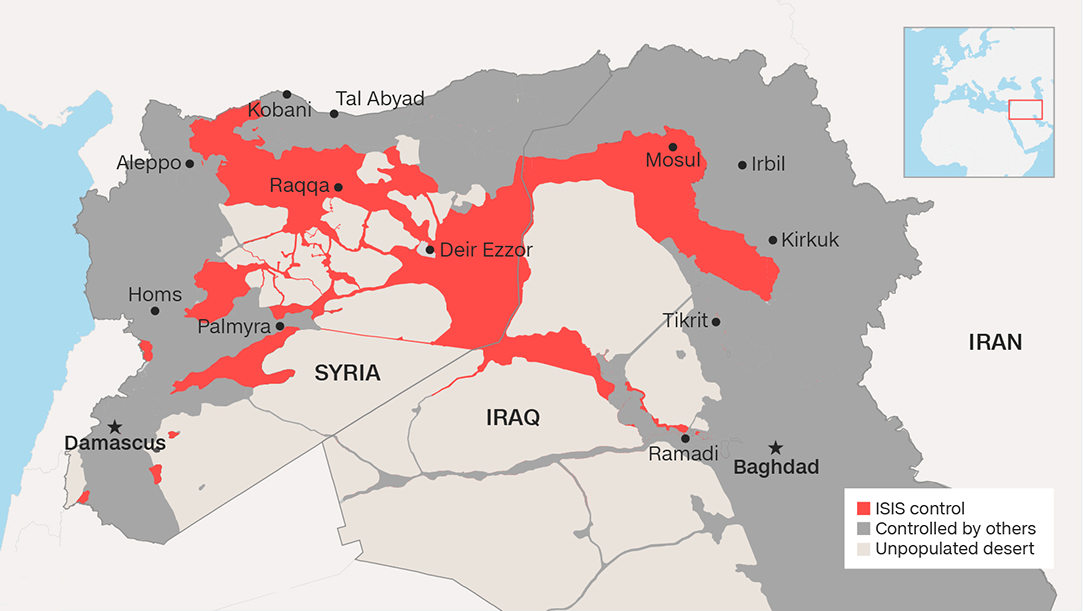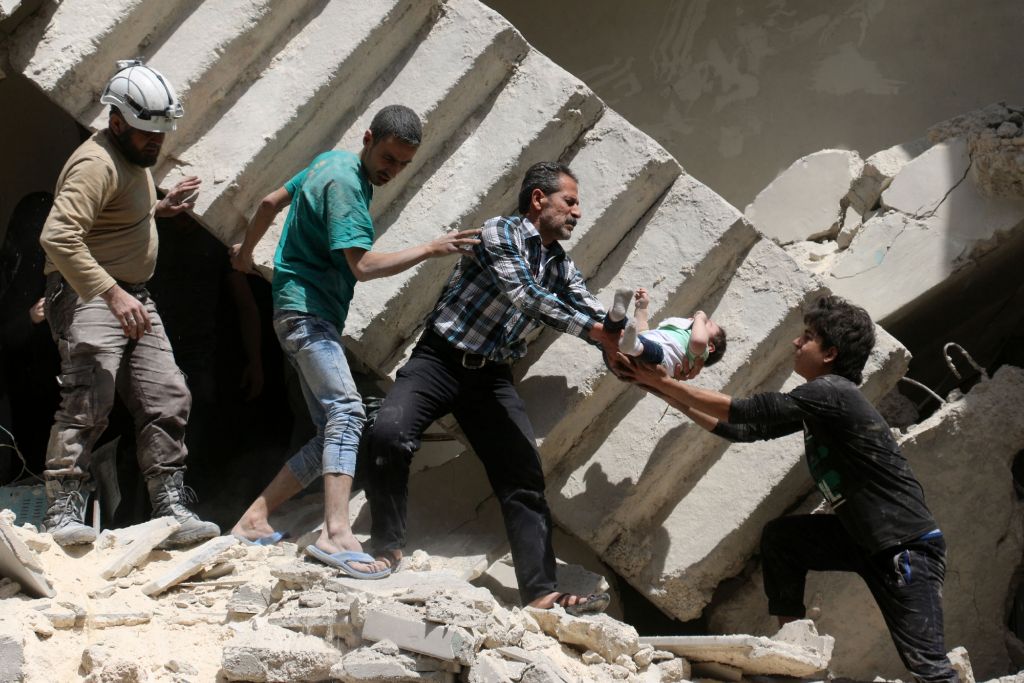Aleppo’s liberation on the horizon
Empowering Weak & OppressedYusuf Dhia-Allah
Rabi' al-Awwal 01, 1438 2016-12-01
Main Stories
by Yusuf Dhia-Allah (Main Stories, Crescent International Vol. 45, No. 10, Rabi' al-Awwal, 1438)
Syrian forces make rapid progress with Russian air support against the terrorists in eastern Aleppo. Next stop will be Raqqa.
After a three-week pause, Syrian and Russian forces resumed aerial strikes on takfiri terrorists in eastern Aleppo on November 15. The attacks on terrorist strongholds caused alarm and despair in Western capitals. Western regimes claim in public that they are against the terrorists but when Russian or Syrian forces attack them, the West expresses alarm. The same day (November 15) US President-elect Donald Trump spoke to his Russian counterpart Vladimir Putin in what is believed to have been a cordial discussion that can only spell doom for the terrorists.
Western television networks also worked themselves into lather over what they interpreted as Trump’s acquiescence to Putin’s bombing campaign against the terrorists. They have focused on civilians injured in eastern Aleppo as a result of air strikes. The eastern part is under the terrorists’ control and although the three-week cessation of bombings by Russian and Syrian forces was meant to facilitate delivery of food aid and the evacuation of civilians, the terrorists bombed the aid convoys. Far from condemning these terrorist crimes, the Western media attempted to blame Russia and Syria instead. Even as the campaign against eastern Aleppo is underway, there are safe corridors for civilians to exit from that part of the city. The terrorists are preventing them from doing so.
Both during and after the election campaign, Trump said he would review Washington’s Syria policy. He questioned whether the label “moderate rebels” applied to some terrorist groups was accurate. He is skeptical about their utility and has said the US does not know who these groups are. He has also stated that they may turn out even worse than al-Qaeda and Da‘ish.
When Katty Kay of the BBC World News asked Leon Panetta, CIA director in Barack Obama’s first term as president, to comment on Trump’s remarks about not knowing the terrorists, he agreed. Panetta said many serving officials also do not fully understand what US policy in Syria is and who the terrorists are. This was an astonishing admission from a man who is so close to the US intelligence establishment. Yet over the five-year period, Western, especially American, officials have made bold pronouncements about the “moderate rebels” they are supporting to overthrow the government of President Bashar al-Asad.

Trump’s election has led to complete despair among the takfiri terrorists in Syria. In a meeting in Stockholm on November 8, takfiri political leaders, hoping to celebrate Hillary Clinton’s victory, went instead into shock when it emerged that Trump had won. Martin Chulov of the British daily, The Guardian captured their mood fairly accurately with the headline “Syrian opposition left with nowhere to turn after Trump’s victory” (November 11, 2016). He reported, “The reaction was simple,” said one of the participants at the meeting, talking of Trump’s victory speech. “One of the leaders shrugged and said ‘we are like cockroaches, nothing can kill us,’ and then they moved on.” This confirmed yet again that the West (and its Arabian allies) has been supporting the terrorists in Syria all along.
President al-Asad meanwhile has welcomed Trump’s victory and said he was ready for a meaningful dialogue with the Americans on confronting the terrorists. He made the remarks in an interview with Portuguese television on November 18. Whether the US would accept al-Asad’s offer is yet to be seen but signs from the Trump camp can only give hope to the Syrian government while it leads to further despair among the terrorists.
If life in eastern Aleppo under terrorist control is miserable for the civilian population, the rest of Aleppo’s population under government control leads a fairly normal life. Schools and universities remain open and people go about their business uninterrupted as if there was no war just a few blocks away. True, life has been seriously affected by the foreign-instigated war but the Syrian people have shown a remarkable resilience in the face of these challenges.
There is now renewed optimism that the terrorists would soon be defeated in Aleppo. In mid-October, they had tried to break the siege of Aleppo but were unsuccessful. Trump’s victory has dealt another blow. At the same time, the Iraqi army and its allied militia, the Hashd al-Sha‘bi, are making slow but steady progress in and around Mosul. There are many players involved in the attack on Mosul, Iraq’s second largest city, but not all of them are pursuing the same agenda. The Americans, for instance, had been blowing their own trumpet about the “help” they are providing to the Iraqi army. This was aimed at boosting Hillary Clinton’s chances of winning the presidential race. It did not happen. In fact, the Americans had deliberately left the western part of Mosul wide open for the takfiris to flee the city and seek refuge in Raqqa or Aleppo to continue the war against al-Asad’s government. The Hashd militia frustrated this plan by blocking the takfiris’ escape route westward.

In and around Mosul, the Iraqi army discovered two mass graves. Both contained the bodies of Iraqi soldiers and police who had been executed by the takfiri terrorists. The takfiris are resorting to other criminal acts as they face imminent defeat. They have set oil fields on fire and have also used chemical weapons on three different occasions. Civilians who managed to escape Mosul have reported that the takfiris have stockpiled a lot of chlorine and other chemicals for use against advancing Iraqi forces and the Hashd militia.
In areas where the oil fields are burning, people are suffering from acute respiratory and eye problems. The takfiris have shown by their criminal acts that they have no regard for human life. They are prepared to resort to any criminal act to keep their hold on territory.
The choice facing them is stark: protect their fighters or cling to territory. Their moves indicate that they are prepared to sacrifice as many fighters as possible but cling to territory. In this cynical campaign, the terrorist leaders are prepared to sacrifice every fighter starting with foreign fighters who are used as cannon fodder in this cynical campaign. Liberation of Mosul from the takfiris’ clutches would be a very serious blow since it was in this Iraqi city that the self-styled khalifah, Abu Bakr al-Baghdadi made his debut and declared his so-called Islamic state in 2014. Mosul was declared capital of the “Islamic State.”
Aleppo and Raqqa may fall before Mosul for several reasons. First, the Syrian army backed by Russian air power is making steady process in eastern Aleppo as well as Raqqa. In fact, on November 20, the Syrian Democratic Forces (SDF) — made up of Kurdish and Arab forces — announced they had liberated the important hilltop of Tal Saman, located 25km from the heart of Raqqa. The victory came after two days of fighting. The takfiris are under intense pressure and there is nowhere for them to escape to.
On November 20, the UN Special envoy for Syria, Stefan de Mastura, in a meeting with Syrian Foreign Minister Walid al-Muallem made the preposterous proposal to establish an autonomous region run by foreign-backed takfiri terrorists in eastern Aleppo. Not surprisingly, the Syrian foreign minister, during a televised press conference in Damascus, dismissed it out of hand saying “This is a violation of our sovereignty.”
With the liberation of eastern Aleppo and Raqqa, the takfiri project would be effectively over in Syria. The Syrian government now controls 70% of territory. Idlib and Hama provinces would come next, but with the takfiris badly demoralized both as a result of the withdrawal of US support and the relentless pressure of Syrian and Russian forces, their days appear numbered.
Mosul’s liberation is likely to take much longer — perhaps several months — but it will eventually occur even if the cost in human lives is huge. This is the price Iraq has to pay for abandoning the city when the takfiris first stormed the city in June 2014. The Iraqi army simply disintegrated and fled. Initially, the people of Mosul welcomed the takfiris as “liberators” only to discover what a brutal bunch they are. Now they wish to have nothing to do with them. The civilian population is held hostage and being treated as human shields.
Reports from the warfront indicate that the takfiris have heavily mined all approaches to Mosul. Further, they have taken up positions on buildings and intend to fight to the bitter end.
The question uppermost on everyone’s concerns al-Baghdadi and whether he is dead or alive. There were reports that he has already appointed his successor, clearly indicating that he finds no escape from Mosul and is prepared to die there.
It would be worthwhile for the Iraqi army to make a serious effort to capture this man alive and interrogate him to ferret out the truth about his backers. What is, however, more likely is that the Americans would kill him before he is captured. After all, they do not want him to spill the beans and expose America’s role in his recruitment and support for so many years. Don’t forget US Senator John McCain’s meeting with him in May 2013 whose photographs were inadvertently released by his office.

